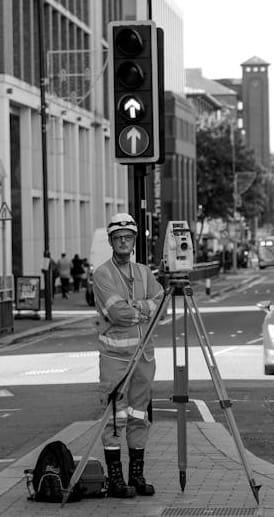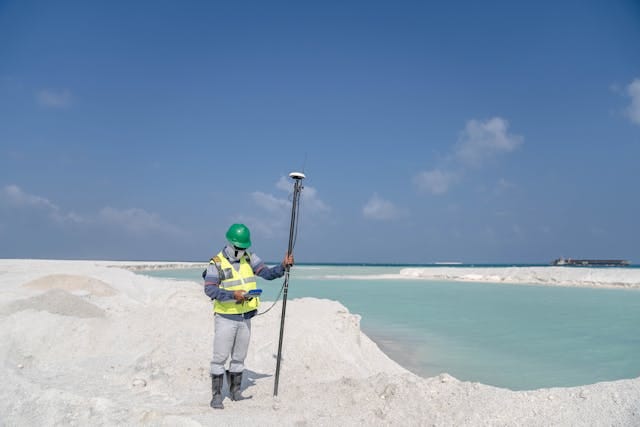A Career Path Nobody Knows About

There are a lot of shitty jobs out there.
You could be hammering shingles up on a roof, pumping sewage, or stuck in a sterile office trapped in a series of Zoom meetings.
It’s hard to choose what you want to do for a living, especially if you’re a young man with limited experience.
The jobs that pay well are tedious, difficult, or require next-level education (i.e. petroleum engineering). The jobs that are fun don’t pay well.
When I first started surveying, I never knew I would be doing it 25 years later.
I went to school for business. I thought I would be working in an office.
Yet, here I am still doing it.
Not everybody can do this job.
I’ve seen several people start out strong, but later quit because they couldn’t handle it, or they were let go due to incompetence.

What is Land Surveying?
Land surveying is the art and science of measuring and mapping the land to determine boundaries, features, and elevations for construction, property ownership, and legal documentation.
This profession sits at the intersection of math, engineering, and law.
When I’m talking to someone who doesn’t know much about surveying, I tell them that I take measurements professionally for a living.
Every new piece of infrastructure requires a land surveyor.
People hire us when buying or selling houses to establish property lines.
They hire us when they want to build a new fence or addition.
Engineers hire us to do topographic mapping of an area to determine how water flows over a property in order to help them design features.
Construction companies hire us to show them where to build roads, houses, and buildings so that they’re exactly where they need to be and not encroaching on a neighboring property.

What Will I Be Doing?
There are many roles in land survey companies.
If you’re a licensed surveyor, you plan, direct, check, and approve all work coming in and out of your office.
Becoming a licensed surveyor is a challenging and heavily involved process.
It requires extensive education, multiple years as an articling student, and a difficult exam. It’s similar to becoming a lawyer.
Thinking of becoming licenced? Do your research first. This isn’t something to half-ass.
You do NOT need to be licensed to work for a land surveyor.
There are other roles within survey companies such as research roles. This involves pulling records from the registry office, other survey companies, and online in order to get it ready for the field.
Then there are the field technicians, or party chiefs as they are traditionally called. This is my role.
These people go out into the field and perform the survey work. They collect data, find and mark boundaries, stake locations, and perform other work that can’t be done from inside an office.
After the field work is completed, the data is brought back to the office where it gets checked for quality control.
Sometimes calculations are made, and we need to go back into the field to do more work, but if everything is finished and it looks good, the work is sent over for drafting.
The drafters usually use AutoCad or a similar program to create a final plan to register and/or give to the client.
Other jobs at a survey office may include receptionist, accounting, and sometimes human resources.

What Are the Benefits to Becoming a Land Surveyor?
The thing I enjoy the most about being a surveyor is getting paid to work outside all day.
I’m not trapped in a stuffy office with a micromanaging boss or HR lady breathing down my neck. I’m almost completely autonomous.
This job is physically demanding. It’s a lot of walking, carrying, and swinging a sledge hammer. It’s going to keep you in shape.
A lot of trades wear out and damage your body over time. While this can happen with surveying, it’s not as prevalent as it is with most trades.
I work on all kinds of projects, and get to see daily life in several industries from many angles.
- Residential
- Commercial
- Industrial
- Agriculture
- Roads
- Bridges
- Hydro
- Infrastructure
With many of these jobs, I wind up learning more about the lay of the land than the property owners.
On top of that, I get to learn about different professions and industries.
The pay is good, and there’s job security most of the time.
With the skills I’ve learned, I can go almost anywhere. I don’t have to tolerate abusive bosses or toxic work environments.
It takes a long time to properly train someone. You can’t just hire some bum off the street and expect him to be job-ready after a few weeks.
It took me years to fully understand what it is that I’m doing.
Once you have these skills, you’re pretty much set for life and get to decide where and how you’re going to work.
The skills you learn in surveying also transfer to other careers if you decide you want to do something else. Engineering, real estate, construction, and GIS all benefit from knowledge of surveying.
You can start working in the field as a party chief, and later become a licensed surveyor. From there, you can become a partner in a survey company, or start your own.
I know several people who have gotten their licenses since I started working at my current company. They’re all very intelligent, driven, and hard-working.
Even if you don’t go that route, you can start working in the field and later move inside to do drafting or research.
A lot of people are concerned that their position is going to be replaced with AI.
While some of the drafting and research may be replaced, automated, or augmented with AI, when it comes to the field work - people are still needed.
This is a career in high demand. As I mentioned earlier: every infrastructure job requires surveying.
On top of that, a lot of surveyors are older and getting ready to retire. In Ontario, it’s estimated that 40-60% of licensed surveyors will retire in the next decade.
This entire field is ripe for the taking.

What Kind of Person is Best Suited to Land Surveying?
For starters, you need to be good with math.
You don’t need to be a math whiz, but you need to be able to do basic calculations on the fly.
This job uses a lot of trigonometry, along with basic addition, subtraction, multiplication and division.
Thankfully, we have calculators on our phones, and the software we use does most of the heavy lifting; but you still need to know math.
You don’t need a degree to get started.
I got my start when I was still in high school, as did other people I work with.
That said, just about everybody I know in this profession has either a college or university education.
If this is something you’re serious about pursuing, a Bachelors of Engineering is the best degree to start with. The next best would be a Bachelors of Science.
If you’re trying to work in the office, you need to have technical skills and be good with computers.
Survey companies sometimes use obscure programs and software where there’s a learning curve.
Microsurvey and AutoCad are the two programs I’ve encountered the most.
Field technicians also need a good degree of technical know-how. Oftentimes, they process their own work.
You’re going to learn how to operate total stations, global positioning systems (GPS), scanners, and data collectors.
Companies like Leica, Topcon, and Trimble make similar instruments for surveying, but each one works slightly differently.
It’s important to understand the ins and outs of the equipment you work with.
You need clean handwriting to draw field notes for each job.
I often tell people that the weather is the best - and worst part of this job.
I regularly encounter intense heat, cold, rain, snow, ice, bugs, thorns, wildlife, and everything else nature can throw at me.
In the wintertime, I work half as fast.
The reason is because I spend a lot of time digging through snow banks looking for survey monuments, or making room to set up my total station.

This job requires you to work in nearby and neighboring properties. People don’t always want you around, and can become angry or hostile.
Sometimes, the cops get involved.
This happened to me one time when I was staking a property boundary.
A neighbor ran over yelling, ripping my stakes out of the ground, throwing them across the lawn, and getting in my face.
When this happens, I ask them to call my office and speak to my project manager.
I then called my project manager and informed him that he was about to receive an angry phone call.
Five minutes later, my phone rings. I answer it.
I thought it was my manager.
It was the police.
This neighbor threatened to hurt me when he spoke to my project manager, so he called the cops.
Ten minutes later, an officer showed up to my job.
The neighbor ran off and hid.
The cops hung out and I had a police escort for the rest of the day while I finished my work.

You need to be able to work under pressure. There is a lot riding on what you do.
For example, let’s say you need to get a footing laid out before the concrete truck arrives at noon.
If you take too long and miss the deadline, it’s costing a lot of money to have their employees standing around waiting for you.
If you make a mistake, and it isn’t caught early enough, the project may need to be torn down.
It could cost tens, hundreds of thousands, or even millions of dollars to fix it.
When projects go wrong, everybody is getting sued.
Licensed surveyors carry insurance for this reason, and it’s very expensive. Every time a claim is made, those premiums skyrocket.
Driving is a must - not so much if you’re working in the office, but as a field technician, you need to be able to get to the job site.
If you don’t have a driver’s license, get it.
If you have it, don’t do anything stupid. I know a couple of guys who couldn’t keep their jobs after losing their licenses to a DUI.
There’s nobody supervising you in the field. No one is going to tell you what to do.
You need to be motivated enough to work independently to get the job finished.
Your work hours may be demanding.
If a client needs something done by a certain time, you might need to start early.
And you don’t always get to leave at quitting time. Many times, you keep working until the job is complete.

Who Is The Ideal Surveyor?
To me, the ideal surveyor is:
- An avid outdoorsman
- Someone smart enough to pursue a career in engineering or similar field, but doesn’t want to be stuck in an office
- They can work independently.
- They have a valid driver’s license and are able to travel.
- They’re curious to learn new things, and can pick up new skills quickly.
- They pay attention to detail.
How Do I Get Started?
If this article piqued your interest, and you’re wondering the next steps to take, consider the following:
- Research local survey companies, then reach out to them to see if they need help. Workloads usually pick up during the summer months, and that’s when most of the hiring happens.
- If you’re still in school, see if you can get a co-op job with a survey or construction company. Sign up for math and trigonometry courses and take them seriously.
- Get your driver’s licence if you don’t already have it.
- Be ready to show up early, work hard, and not complain.
Land surveying isn’t glamorous. It won’t make you famous. But if you’re a young man looking for purpose, good money, and a job that actually matters, it’s a solid path.
You’ll learn technical skills, stay physically strong, and spend your days outside instead of rotting under fluorescent lights listening to Karen in HR. If you stick with it, you can build a career most people never consider.
If this sounds like something you can see yourself doing, check out more of my articles, and don’t forget to Subscribe.
If there’s someone you know who may be interested in a career in surveying - Share this article with them.
If you're serious, feel free to reach out to me—I can help you figure out if surveying is right for you, and how to break into the field.
God Bless.
Member discussion